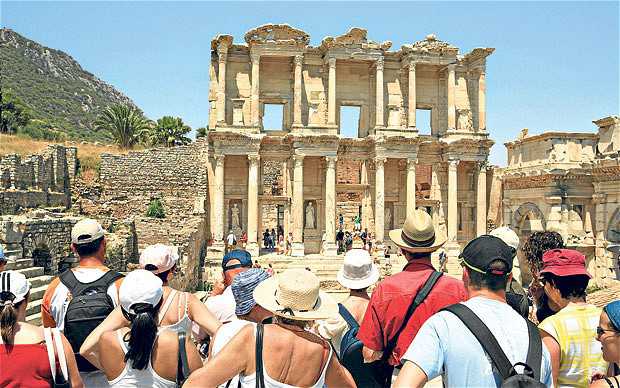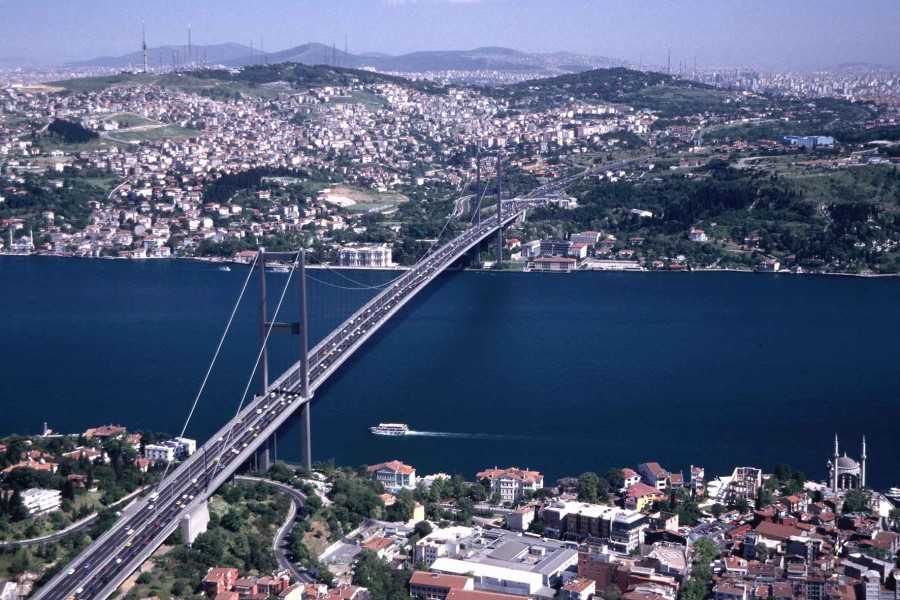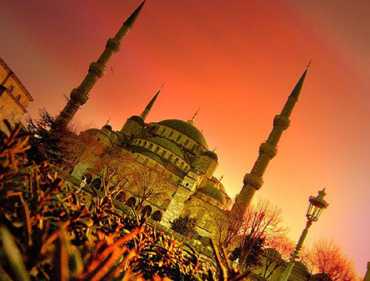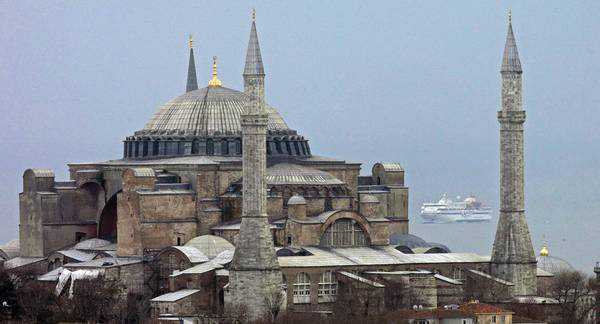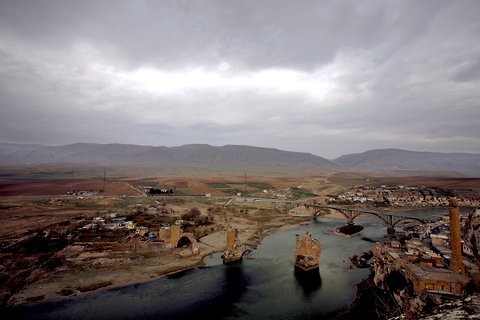By ANDREW HIGGINS
ANKARA, Turkey — The Ataturk Thought Association, zealous guardian of the secular creed that guides Turkey, never thought it would come to this.
Its chairman, a retired four-star general, is in jail. Its offices — plastered with portraits of modern Turkey’s founding father, Mustafa Kemal Ataturk — have been raided by police. Several of its computer hard drives have been seized by investigators. They’re hunting for evidence of plots by hard-line secularists to topple Turkey’s mildly Islamic government.
| 1 |
| Associated Press |
| Pro-secular demonstrators, one of them holding a portrait of Ataturk, left, chanted slogans during a protest in Istanbul earlier this month. |
The assault, declares Suay Karaman, a land surveyer now filling in for the Thought Association’s imprisoned chairman, shows that “there is no such thing as moderate Islam.” Raids in Ankara and Istanbul came in the weeks before the country’s Constitutional Court on Monday began considering the secularists’ own offensive: a suit to outlaw the governing party for violating secular mandates Ataturk enshrined in 1923. (Please see related article on Page A10.)
A final battle looms to decide whether Turkey remains a secular republic faithful to Ataturk, says Mr. Karaman, or instead “becomes like Saudi Arabia.”
Warnings of the demise of Ataturk’s legacy have been around almost since he died 70 years ago. A relentless modernizer, hearty drinker and fan of the fox trot, the founder of the Turkish Republic — his name means “father of the Turks” — had issues with Islam. He shut down Islamic schools, banned Islamic garb and opened a German brewery in his new capital, Ankara. His was hardly the path of least resistance in a land that is 99% Muslim, once ruled Mecca and was for centuries home to the Caliph, Islam’s supreme leader. Yet Ataturk’s way prevailed for decades.
Now, says Mr. Karaman, it faces grave peril. In February, Turkey’s elected government — led by observant Muslims whose wives mostly wear headscarves — moved to let pious female students cover their hair on university campuses, something that had been banned for years as an affront to secular traditions.
The Constitutional Court quickly put a stop to that, and the chief prosecutor, an ardent secularist, filed suit in March, asserting that the governing party poses a “clear and present” danger and must be stopped before it imposes Islamic law. Outlawing the Justice and Development, or AK, Party could rock its leaders — and the country — politically, though they likely could reorganize under another banner without giving up power. Tensions were stoked late Sunday, on the eve of the court taking up the case, by two bombs in Istanbul that killed 17 people. There was no immediate claim of responsibility.
The headscarf effort, says Mr. Karaman, along with the arrest of his boss and scores of others, has exposed what he calls the governing party’s hidden agenda — a plan to turn Turkey into an Islamic theocracy. Chanting “Turkey will not be Iran,” activists in the Ataturk Thought Association held a noisy protest on July 19 in Istanbul, waving portraits of their jailed chairman, Sener Eruygur, and of Ataturk. A few days later, more than two dozen people were arrested as part of a sprawling search for antigovernment plotters. Mr. Eruygur hasn’t been charged; his lawyer has said he is innocent of wrongdoing.
Many, including foreign diplomats, scoff at the notion that Turkey now is governed by a cabal of closet fundamentalists. The AK Party generally is friendly to the West — friendlier than many secular activists, in fact. Party officials deny harboring anti-Ataturk tendencies.
One thing is clear: Ataturk worship, the world’s most enduring personality cult, still holds this increasingly prosperous nation of more than 70 million people in its thrall. Ataturk shows scant sign of going the way of his contemporaries. Vladimir Lenin lies in Red Square but is barely mentioned in Russia now, except as a butt of jokes. Even Mao Zedong, embalmed in Tiananmen Square, has slipped from his pedestal: The Chinese Communist Party’s official view of him is 70% good, 30% bad.
Untouchable Ataturk
Ataturk, revered for defeating invading British, French and Greek forces, is untouchable. His mausoleum in Ankara drew more than 12 million visitors last year, up by four million from 2006. The constitution bans all deviation from the “reforms and principles” of “the immortal leader and the unrivalled hero.” It is illegal in Turkey to publicly curse him. Virtually nobody, including members of the AK Party, disses him, at least not in public. One young, headscarf-wearing woman recently said on TV, “I do not like him.” She is being investigated by prosecutors.
Politicians invoke Ataturk’s name to justify starkly different agendas. Even Ataturk’s long-deceased wife, whom he divorced, has been dragged into furor: Did she or didn’t she observe Islamic custom and cover her head? An AK Party legislator has contended that she did. That question is among the issues to be mulled by the Constitutional Court.
Just as Muslim activists mine the Quran for verses to boost their cause, Turkey’s hard-line secularists and their foes delve into Ataturk’s voluminous writings and speeches — Turkey’s secular scripture. The sheer volume of Ataturk’s words gives plenty of scope for argument: a single speech he gave in 1927 lasted 36 hours, spread over six days.
For Mr. Karaman of the Ataturk Thought Association, a bastion of Turkey’s secular establishment, the key text is one of Ataturk’s shorter works, a 230-word address to Turkish youth. It warns against “malevolent people at home and abroad,” and urges ceaseless struggle against any “traitors” who worm themselves into power. That dark fear, says Mr. Karaman, has taken shape in the form of the AK Party. Among signs of this, he says, are the woes of his group.
The governing party’s own claim of allegiance to Ataturk only demonstrates its deviousness, says Mr. Karaman. When Recep Tayyip Erdogan, now Turkey’s prime minister, launched the AK Party in 2001, he did so in a hall bedecked with a giant portrait of Ataturk. The event began with a minute’s silence in Ataturk’s memory. “All fake,” huffs Mr. Karaman.
Suat Kiniklioglu, an AK Party legislator, says he has “no problems at all” with “Ataturk’s principles” but the key issue is “how we interpret them.” Ataturk’s “true genius,” he says, was his “ability to adapt to change.” Clinging to details from the 1920s, he says, “will not work.”
Secularism a la Ataturk is not a simple formula. Unlike America’s founding fathers, who separated church and state, Ataturk did not so much split Islam from the state as subordinate it to the state. He abolished the post of Caliph and placed all mosques and Muslim clerics under a government department. At the same time, he purged religion from other state agencies.
Ataturk, a very stylish dresser himself, clearly didn’t like traditional Islamic garb, viewing it as an emblem of backwardness. His best-known comments on the dress question came in 1925 when he declared “international” — that is, Western — dress as “very important and appropriate for our nation. We shall wear it.”
Legislation he introduced, known as the Hat Law, did not explicitly prohibit veils or headscarves and focused instead on banning fezzes and turbans for men. The ban on headscarves in colleges dates not from Ataturk, say its opponents, but from a 1980 coup by the military, which also tried, in vain, to crack down on miniskirts. Mr. Karaman says the spirit, if not the letter of the 1925 law, requires modern dress for both sexes.
A Furious Row
During a discussion of the 2006 budget by legislators, a furious row erupted over Islam, Ataturk and headwear, when AK Party legislator Musa Uzunkaya asserted that Ataturk’s wife, Latife Hanim, attended meetings at the presidential mansion in the 1920s with her hair covered. Was she a “reactionary?” he asked. The question enraged ardent secularists, who saw it as defiling Ataturk’s memory.
Ipek Calislar, the author of a biography of Turkey’s first first lady, says she sometimes hid her hair only so conservatives could not push Ataturk “into a corner because of her dress.” It wasn’t an endorsement of Islamic norms, says Ms. Calislar: “People are arguing about this in a very stupid way.”
Next to his desk, Mr. Karaman keeps a big photograph of Ataturk in military uniform. Ataturk, he predicts, will ultimately triumph. His hero, he says, would be in no doubt about how to confront any assaults on Turkish secularism were he still alive today: “He would put his army boots back on and start fighting.”
–Farnaz Fassihi contributed to this article.
Write to Andrew Higgins at [email protected]2
| |
URL for this article:
|
| |
Hyperlinks in this Article:
(1)
(2) mailto:[email protected]
(3) |

